-
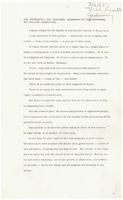 President Johnson’s Message to Congress on Voting Rights
President Johnson’s Message to Congress on Voting Rights President Johnson appeared before a televised, joint session of Congress to deliver a speech calling on Congress to pass a voting rights bill. Embracing rhetoric of the civil rights movement, he declared that the nation “must overcome the crippling legacy of bigotry and injustice. And, we shall overcome.” With the exception of Southerners, the entire House chamber stood and cheered, interrupting the president with thirty-nine ovations.
-
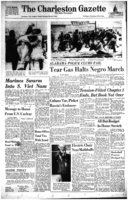 "Police Clubs Fail: Tear Gas Halts Negro March" news article
"Police Clubs Fail: Tear Gas Halts Negro March" news article The news article describes the violent action taken by Alabama state troopers against the civil rights protesters.
-
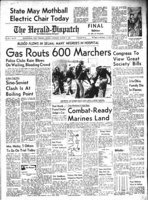 "Blood Flows in Selma, Many Negroes in Hospital: Gas Routs 600 Marchers" news article
"Blood Flows in Selma, Many Negroes in Hospital: Gas Routs 600 Marchers" news article The Herald-Dispatch article described the violent attacks on marchers in Selma.
-
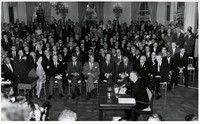 Photograph of President Lyndon Baines Johnson signing the 1964 Civil Rights Act
Photograph of President Lyndon Baines Johnson signing the 1964 Civil Rights Act Congress passed civil rights acts in 1957 and 1960, but these produced only moderate gains. Civil rights activists became more active through sit-ins, boycotts, and Freedom Rides. In 1963 the Civil Rights Movement hit a turning point. That year saw the murders of civil rights workers, the March on Washington, and the deaths of four young girls in the bombing of Birmingham’s 16th Street Baptist Church. In June, President John F. Kennedy addressed the nation about his Civil Rights Act, and following his assassination in November, President Lyndon Johnson continued pressing for passage of the bill. The Civil Rights Act of 1964 outlawed discrimination on the basis of race, color, religion, sex, or national origin; required equal access to public places and employment; and enforced desegregation of schools.
-
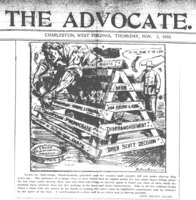 The Advocate cartoon
The Advocate cartoon African American artist John Henry Adams’ cartoon depicts a white man penning in black men with boards that read “state rights,” “mob,” “Jim Crow Law,” “Disenfranchisement,” and others. He wrote, “A votelessman [sic] is a slave and in no other way is slavery possible.”
-
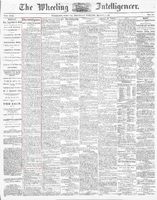 The Wheeling Daily Intelligencer
The Wheeling Daily Intelligencer The United States Congress passed the Fifteenth Amendment to the Constitution on February 26, 1869. The debates of the West Virginia Legislature, recorded in The Wheeling Daily Intelligencer, reveal support and trepidation for the proposed Fifteenth Amendment. The Senate debated whether to send the Amendment to the people of West Virginia for a vote but ultimately decided to ratify the Amendment in the legislature. Many argued that negro suffrage had been forced on the South, so they too should accept this “result of the war.” West Virginia ratified the Amendment on March 3, 1869, the second state to do so. It was enacted in February 1870.
-
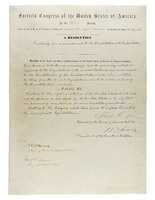 The House Joint Resolution proposing the 15th amendment to the Constitution
The House Joint Resolution proposing the 15th amendment to the Constitution The United States Congress passed the Fifteenth Amendment to the Constitution on February 26, 1869. It was enacted in February 1870.
-
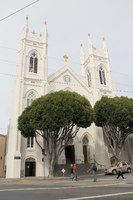 National Shrine of St. Francis of Assisi
National Shrine of St. Francis of Assisi
 President Johnson’s Message to Congress on Voting Rights President Johnson appeared before a televised, joint session of Congress to deliver a speech calling on Congress to pass a voting rights bill. Embracing rhetoric of the civil rights movement, he declared that the nation “must overcome the crippling legacy of bigotry and injustice. And, we shall overcome.” With the exception of Southerners, the entire House chamber stood and cheered, interrupting the president with thirty-nine ovations.
President Johnson’s Message to Congress on Voting Rights President Johnson appeared before a televised, joint session of Congress to deliver a speech calling on Congress to pass a voting rights bill. Embracing rhetoric of the civil rights movement, he declared that the nation “must overcome the crippling legacy of bigotry and injustice. And, we shall overcome.” With the exception of Southerners, the entire House chamber stood and cheered, interrupting the president with thirty-nine ovations. "Police Clubs Fail: Tear Gas Halts Negro March" news article The news article describes the violent action taken by Alabama state troopers against the civil rights protesters.
"Police Clubs Fail: Tear Gas Halts Negro March" news article The news article describes the violent action taken by Alabama state troopers against the civil rights protesters. "Blood Flows in Selma, Many Negroes in Hospital: Gas Routs 600 Marchers" news article The Herald-Dispatch article described the violent attacks on marchers in Selma.
"Blood Flows in Selma, Many Negroes in Hospital: Gas Routs 600 Marchers" news article The Herald-Dispatch article described the violent attacks on marchers in Selma. Photograph of President Lyndon Baines Johnson signing the 1964 Civil Rights Act Congress passed civil rights acts in 1957 and 1960, but these produced only moderate gains. Civil rights activists became more active through sit-ins, boycotts, and Freedom Rides. In 1963 the Civil Rights Movement hit a turning point. That year saw the murders of civil rights workers, the March on Washington, and the deaths of four young girls in the bombing of Birmingham’s 16th Street Baptist Church. In June, President John F. Kennedy addressed the nation about his Civil Rights Act, and following his assassination in November, President Lyndon Johnson continued pressing for passage of the bill. The Civil Rights Act of 1964 outlawed discrimination on the basis of race, color, religion, sex, or national origin; required equal access to public places and employment; and enforced desegregation of schools.
Photograph of President Lyndon Baines Johnson signing the 1964 Civil Rights Act Congress passed civil rights acts in 1957 and 1960, but these produced only moderate gains. Civil rights activists became more active through sit-ins, boycotts, and Freedom Rides. In 1963 the Civil Rights Movement hit a turning point. That year saw the murders of civil rights workers, the March on Washington, and the deaths of four young girls in the bombing of Birmingham’s 16th Street Baptist Church. In June, President John F. Kennedy addressed the nation about his Civil Rights Act, and following his assassination in November, President Lyndon Johnson continued pressing for passage of the bill. The Civil Rights Act of 1964 outlawed discrimination on the basis of race, color, religion, sex, or national origin; required equal access to public places and employment; and enforced desegregation of schools. The Advocate cartoon African American artist John Henry Adams’ cartoon depicts a white man penning in black men with boards that read “state rights,” “mob,” “Jim Crow Law,” “Disenfranchisement,” and others. He wrote, “A votelessman [sic] is a slave and in no other way is slavery possible.”
The Advocate cartoon African American artist John Henry Adams’ cartoon depicts a white man penning in black men with boards that read “state rights,” “mob,” “Jim Crow Law,” “Disenfranchisement,” and others. He wrote, “A votelessman [sic] is a slave and in no other way is slavery possible.” The Wheeling Daily Intelligencer The United States Congress passed the Fifteenth Amendment to the Constitution on February 26, 1869. The debates of the West Virginia Legislature, recorded in The Wheeling Daily Intelligencer, reveal support and trepidation for the proposed Fifteenth Amendment. The Senate debated whether to send the Amendment to the people of West Virginia for a vote but ultimately decided to ratify the Amendment in the legislature. Many argued that negro suffrage had been forced on the South, so they too should accept this “result of the war.” West Virginia ratified the Amendment on March 3, 1869, the second state to do so. It was enacted in February 1870.
The Wheeling Daily Intelligencer The United States Congress passed the Fifteenth Amendment to the Constitution on February 26, 1869. The debates of the West Virginia Legislature, recorded in The Wheeling Daily Intelligencer, reveal support and trepidation for the proposed Fifteenth Amendment. The Senate debated whether to send the Amendment to the people of West Virginia for a vote but ultimately decided to ratify the Amendment in the legislature. Many argued that negro suffrage had been forced on the South, so they too should accept this “result of the war.” West Virginia ratified the Amendment on March 3, 1869, the second state to do so. It was enacted in February 1870. The House Joint Resolution proposing the 15th amendment to the Constitution The United States Congress passed the Fifteenth Amendment to the Constitution on February 26, 1869. It was enacted in February 1870.
The House Joint Resolution proposing the 15th amendment to the Constitution The United States Congress passed the Fifteenth Amendment to the Constitution on February 26, 1869. It was enacted in February 1870. National Shrine of St. Francis of Assisi
National Shrine of St. Francis of Assisi